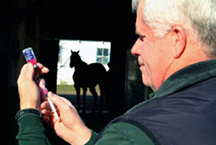
Precautions and vaccinations needed to stem horse diseases
WEST LAFAYETTE, Ind. — Spring means vaccinations for horses against a number of potentially life-threatening diseases, one of which causes neurological damage and is often mistaken for other illnesses, including rabies and West Nile virus, according to a Purdue University veterinarian.

|
"This is not a new disease, but most people know EHV-1 as rhino and don't associate herpes with an equine disease, although this is not the same as human herpes," said William Hope of the Purdue Community Practice Equine Clinic. "A good vaccination program and quarantines, when horses move to new barns, are the only tools we have."
In a 2002 survey, the American Veterinary Medical Association determined that about 2 million horse owners in the United States don't regularly have veterinary examinations and vaccinations for their animals. That accounts for 45 percent of the country's horse population.
"Unfortunately, we have never had a vaccine for the neurologic form of equine herpesvirus," Hope said. "The only thing we can do is give the horses some protection by keeping their immunity levels up with the respiratory vaccine. Some veterinarians use both the respiratory and the abortion vaccines in an effort to prevent the neurologic strain."
Diagnosis of neurologic EHV-1 is difficult because symptoms can be similar to other diseases that cause fever, incoordination and lack of appetite, such as rabies, EPM (equine protozoal myeloencephalitis), West Nile virus and Eastern and Western equine encephalitis, he said. Some equine neurologic diseases, such as rabies and Venezuelan equine encephalitis, also pose a danger to humans.
Along with rhino vaccinations, in the early spring and fall horses should be vaccinated against West Nile virus, tetanus, flu, eastern and western equine encephalitis, and Potomac horse fever. Rabies vaccine should be given annually. Owners should consult with their veterinarian about giving the EPM and strangles, or distemper, vaccines. If the horse will be showing or racing, owners will need a certificate showing the animal has received an EHV-1 vaccination and a Coggins test showing it is negative for equine infectious anemia.
Over the past few years, multiple EHV-1 cases have occurred in barns resulting in the deaths or necessary euthanasia of a number of horses, including 12 at University of Findlay in Ohio. Last winter, several famous equine facilities in Maryland, including Pimlico Race Course, home of the second of the Triple Crown races, were quarantined due to EHV-1 outbreaks.
The disease spreads mainly through airborne contamination. It has been identified in different horse breeds throughout the United States. There also has been increased incidence of the disease in England. EHV-1 also can be spread by nasal discharge. Some infected horses show no signs of the disease, and veterinarians don't know why it sometimes appears as the neurologic form.
"EHV-1 doesn't appear to be weather related, although most of the serious cases have been confined to racetracks during the winter and early spring," Hope said. "However, it occurs at all times of the year. All horses should have an EHV-1 booster shot in the spring and fall, and horses that race or have a heavy horse show schedule should have boosters up to four times a year.
"EHV-1 doesn't always show up in the same way, so that is one more problem with diagnosing it. Any new horse in a barn should be isolated from the general population for 30 days since horses can be infectious for that long even if they don't show symptoms, and it can take that long for symptoms to appear."
If a horse does contract EHV-1, all the other horses in the bar should immediately receive a booster shot of the rhino vaccine, he said.
Writer: Susan A. Steeves, (765) 496-7481, ssteeves@purdue.edu
Source: Bill Hope, (765) 494-8548, hopew@purdue.edu
Ag Communications: (765) 494-2722;
Beth Forbes, forbes@purdue.edu
Agriculture News Page
Related Web sites:
Purdue School of Veterinary Medicine
Purdue Department of Entomology
Purdue Extension resources for West Nile virus
Indiana Animal Disease Diagnostic Laboratory
PHOTO CAPTION:
Regular vaccinations can protect horses against a number of potentially fatal diseases, including rabies, West Nile virus, Eastern and Western equine encephalitis. William Hope, a Purdue Community Practice Equine Clinic veterinarian, says that a disease that has been especially troublesome in the past few years is equine herpesvirus-1 (EHV-1). (Purdue file photo/Mike Kerper)
A publication-quality file photo is available at https://www.purdue.edu/uns/images/+2006/EHV-vaccinate.jpg
To the News Service home page